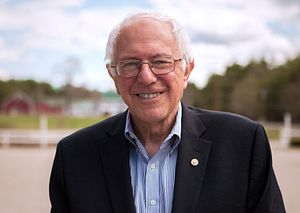China remains an important topic in the ongoing U.S. 2016 presidential primaries. Most Republican candidates have been quite belligerent on the United States’ relationship with Beijing. Donald Trump, the apparent Republican front-runner, has previously accused China of “raping America” financially, and insists that the U.S. consistently gets “beaten” by China in trade negotiations (hear more of Trump on China here.) Ben Carson, currently in second in Republican primary polling, has also been quite vehement in his criticism of China, although he has focused more on cyber espionage and Beijing’s territorial disputes with its neighboring states.
Hillary Clinton, the Democratic front-runner, has a mixed record on China. Previous to her appointment as secretary of state, Clinton had been vocal in her criticism of China’s human rights record, going so far as to encouraging former U.S. President George W. Bush to boycott the 2008 Beijing Olympics. During her tenure as secretary of state, Clinton oversaw the “Pivot to Asia,” a move that has caused much consternation with the Chinese government. However, her tough talk was coupled with close engagement with her Chinese counterparts. According to Kim Ghattas, author of a biography of Clinton’s time as Secretary of State: “The strategy was work with them on what you can, and work around them with civil society to promote your values agenda.”
However, it’s no longer a safe bet that Clinton will win the Democratic nomination. According to RealClearPolitics, Bernie Sanders, the self-styled social democratic governor of Vermont, has been gaining on Clinton in most polls. Although most mainstream media agree that Clinton won yesterday’s first Democratic Party debate, Sanders appears to have won the social media battle, with one poll showing that 69 percent of all tweets mentioning him by name were positive. For Clinton, the number was 53 percent.
So what is Bernie Sanders’ take on China? According to FeeltheBern, a website managed by grassroots Sanders supporters, Sanders has three main focus areas when it comes of U.S.-China relations.
First, Sanders has repeatedly voted against any kind of free-trade agreement with Beijing:
Let’s be clear: one of the major reasons that the middle class in America is disappearing, poverty is increasing and the gap between the rich and everyone else is growing wider and wider is due to our disastrous unfettered free-trade policy.
According to Sanders, free trade with China has only hurt American workers, enriched big Wall Street corporations, and been detrimental to the environment. Sanders claims that over two million American jobs have been outsourced to China since 2001.
Sanders has also accused China of being a currency manipulator, and wants to impose extra tariffs on Chinese imports (ironically, this is reminiscent of Republican candidate Mitt Romney’s stance on Chinese financial policy during the 2012 Presidential campaign.)
This has included fierce resistance to the Trans Pacific Partnership (TPP). Along with several other members of the Congressional Progressive Caucus, Sanders has laid out ten points as to why the TPP is a bad idea. Sanders claims that the TPP will not only outsource more American jobs and further enrich big corporations, but will also damage U.S. competitiveness in the long run. Although China is not a member of the TPP, Sanders has stated that he fears that it might be able to eventually, pointing to Japan’s decision to join last year.
Furthermore, according to Sanders, the TPP has no expiry date, making it impossible for states withdraw from it. (Although the deal is still being negotiated, this seems unlikely; according to the U.S. Trade Representative, the TPP will include a withdrawal clause.)
Interestingly, another point is that the TPP will bolster authoritarian regimes in places such as Vietnam, who, according to Sanders, shouldn’t be “rewarded” for breaking human rights with access to the U.S. market. This seems to be a point of difference between Clinton and Sanders. Clinton has on several occasions stated that dialogue, trade, and cooperation can be the best way to change authoritarian regimes–Sanders implies that using the stick is a better method to get states to improve their human rights record.
Second, Sanders has stated that he is opposed to China’s military build-up and supports continued arms sanctions against Beijing. No big difference from any other U.S. candidate here. However, he has also stated that countries that exports armaments to China should be sanctioned in turn, mentioning several specific measures to punish violators. This includes the denial of participation in cooperative research and development, the prohibition of participation of any foreign military sales, and the removal of all licenses relative to dual-use goods or technology. If followed consistently, this would entail sanctioning states such as Israel, which might be a hard sell on the Hill.
Finally, Sanders has been outspoken in his criticism of China human rights record, especially on Tibet. Sanders has repeatedly supported bills that condemn human rights abuses by the Chinese government in Tibet. This isn’t radically different from Clinton’s own policies on the issue. However, Sanders has stated that he wants to make future Chinese diplomatic missions in the U.S. dependent on the establishment of an American mission in Lhasa. Another tough sell, this time in Beijing.
There are relatively few differences between Clinton and Sanders’ China policy goals. Both think that the TPP is a bad idea, both oppose Beijing’s military buildup and both are critical of China’s human rights record. The main difference lies in the means. Clinton has demonstrated a pragmatic approach to China, having been able to criticize its human rights record while pursuing issues such as trade relations and Iran at the same time. Bernie, on the other hand, is famous for sticking to his principles.
Sounds a bit like Donald Trump vs. Jeb Bush?

































